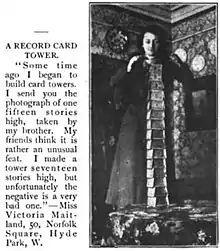House of cards
A house of cards (also known as a card tower or a card castle) is a structure created by stacking playing cards on top of each other, often in the shape of a pyramid. "House of cards" is also an expression that dates back to 1645[1] meaning a structure or argument built on a shaky foundation or one that will collapse if a necessary (but possibly overlooked or unappreciated) element is removed. Structures built by layering in this way, such as Stonehenge, are referred to as "house of cards architecture", which dates back to the Cyclopean and Megalithic ages.[2] The origin of the phrase is debated to be from the 18th century England but some believe that it has an American base.[3]

Description
The structures created using this method rely on nothing more than balance and friction in order to stay upright. Ideally, adhesives or other external connecting methods are not used, and no damage or alterations are made to the cards themselves. The larger the structure, the higher the number of balanced cards that could fail and compromise the integrity of the card building. Professional card stacker Bryan Berg claims, however, that the more cards placed on a tower the stronger it becomes because the weight of the cards pushing down on the base (increasing friction) allows occasional cards to stumble without the entire structure collapsing. He also claims that proper stacking technique allows cards to function as shear walls, giving considerable stability to the structure.[4]
- Different types of card stacking
 A house of cards balancing a single card between its walls
A house of cards balancing a single card between its walls A house of cards, with one level stacked on top of another.
A house of cards, with one level stacked on top of another. Amateur card stadium, similar in design to Bryan Berg's structures
Amateur card stadium, similar in design to Bryan Berg's structures A house of cards with a bridge over the gap between its two pillars
A house of cards with a bridge over the gap between its two pillars
World records

The earliest known record for card stacking was achieved by Victoria Maitland, of the United Kingdom. A photograph of her work was published in The Strand Magazine in September 1901. It was a fifteen-story structure.[5] Following the publication of this record, a second was submitted in April 1902 by Rosie Farner of England with a picture of a twenty-storied tower.[6] A third record was submitted by F. M. Hollams of England, with a tower of twenty-five stories, in February 1903.[7]
Other record holders (without bending or altering the cards) include:
- Joe Whitlam, of England, with twenty-seven stories, on February 28, 1972[8]
- James Warnock, of Canada, with sixty-one stories, on September 8, 1978[9]
- John Slain, of the United States, with sixty-eight stories, on August 3, 1983[10]
- Bryan Berg, of the United States, with seventy-five stories, on April 21, 1992[11]
Berg has since kept the record and created many sub-records. He currently holds the world record for tallest house of cards, a 25-foot-9 7⁄16-inch (7.860 m) "skyscraper" completed at the State Fair of Texas on October 14, 2007.[4] He also holds the record for the largest house of cards, a category Guinness invented for the event, for a replica of Cinderella's Castle at Walt Disney World.[12] On March 10, 2010, Berg broke his own record by building a replica of The Venetian Macao resort hotel. He completed it in 44 days, using 218,792 cards (more than 4,000 decks). The structure measured 10.5 by 3 metres (34.4 by 9.8 ft), and weighed more than 272 kilograms (600 lb).
References
- "Definition of HOUSE OF CARDS". www.merriam-webster.com.
- Stern, Philip Van Doren,. "Prehistoric Europe From Stone Age Man to the Early Greeks" N.Y. Norton, 1969, p.250
- "a house of cards". www.theidioms.com.
- Andrew Menzer (October 16, 2007). "Card stacker hopes State Fair tower breaks his record". Dallas Morning News. Retrieved 2007-11-14.
- The Strand Magazine, September 1901, page 357.
- The Strand Magazine, April 1902, page 497.
- The Strand Magazine, February 1903, page 235.
- Guinness Book of World Records American 14th (Giant 1976) Edition, page 470. "highest claim authenticated", up to 1976.
- "Guinness Book of World Records" American 1982 Edition, page 477.
- "Guinness Book of World Records" American 1987 Edition, page 450.
- "Guinness Book of World Records" American 1994 Edition, page 250.
- "About Berg". Bryan Berg. Archived from the original on 2007-11-10. Retrieved 2007-11-14.
External links
 Media related to Houses of cards at Wikimedia Commons
Media related to Houses of cards at Wikimedia Commons